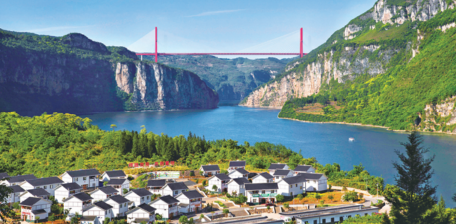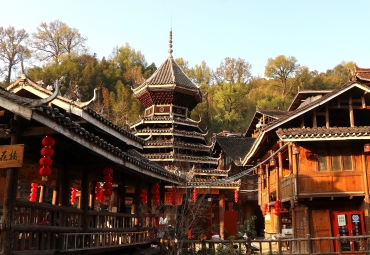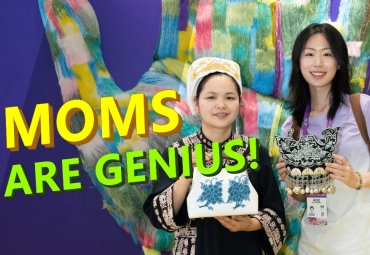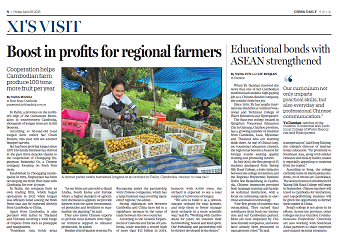Good days are there in the village of Huawu

The village of Huawu is located by the picturesque Wujiang River. SHI KAIXIN/FOR CHINA DAILY
The family of Zhao Yuxue now lives in a small two-story house in the village of Huawu in Qianxi city, Guizhou province, with access to running water, electricity and paved roads, thanks to the local policy of relocating people from inhospitable areas.
That is a stark contrast to what it was like several years ago. The family used to live in the village of Mawozhai, which didn't have any running water, electricity or paved roads.
No longer going out to find work, Zhao decided to start a business in Huawu. In 2021, he opened a farmstay business and registered "Zhao Yuxue's Yellow Rice Cakes" as a trademark for his products. He earns annual revenue of close to 200,000 yuan ($28,640) from selling the cakes wrapped in bamboo leaves.
"This year, I plan to expand the cake production," Zhao said.
Huawu village itself is also an example of development from poverty to prosperity.
"In the 1980s, the per capita farmland area in Huawu was small," recalled Yang Guofeng, a poverty-alleviation official in the village and also a native of Huawu. "Food shortages were a regular occurrence, and many people had to borrow food from others to sustain themselves. If they really had nothing to eat, they lived off wild fruits from the mountains."
Since the 18th National Congress of the Communist Party of China held in 2012, the village has seen huge changes thanks to a series of targeted poverty alleviation policies.
In 2017, 34 Miao ethnic households with 154 members moved out of their dilapidated houses, which lacked running water, electricity and convenient transportation.
"After the villagers moved to the resettlement site, some of them left to find work in the city, some found employment with the village cooperative, and others engaged in planting and breeding, tourism services, embroidery, and batik," Yang said. "In 2021, the village's per capita disposable income reached 19,304 yuan."
The fine-finger skills of residents have also spurred economic development.
The embroidery store in Huawu village stocks a wide range of beautiful handmade Miao embroidered clothes and special trinkets, while workers are busy filling orders in the embroidery workshop.
A special technique passed down by the Miao people, Miao embroidery has a reputation for exquisite workmanship, intricate design, beautiful composition, a rich ethnic style and vibrant color. It has been described as "exclusive high-end fashion" from the deep mountains.
Yang Wenli, a local resident, runs a Miao embroidery workshop in Huawu village. In 2021, Yang Wenli set up a batik embroidery company, which has so far provided stable employment for more than 20 Miao women and allowed more than 70 embroiderers to work at home part-time. In the company's first year, it made sales totaling more than 4 million yuan.
"There are four in my family. Previously, I stayed at home with the children and didn't have any income. Now, I have a job in the workshop, earning about 3,000 yuan a month, so life is improving all the time," said Zhang Ying, a villager employed in the Miao embroidery workshop.
The natural environment is also helping to meet local people's needs for a better life.
On the Wujiang River in Huawu village, visitors can always be impressed with a tranquil scene as tour boats shuttle across the river and water birds dance nearby, the sounds of the water, chirping birds, and laughing tourists all blending into one.
The village was not a scenic area in the past. It has developed into one as a result of a transformation of mindset and practice — as people began to uphold the idea that lucid waters and lush mountains are invaluable assets, to hold fast to the requirements for development and ecological conservation, and to pursue a new path of prioritizing the environment and promoting green development.
"In the past, net-pen aquaculture and fishing caused the local section of the Wujiang River to become seriously polluted," said Xu Lei, secretary of the CPC branch of Huawu village. "Wujiang became a dirty river."
In 2018, the Wujiang River was completely closed to fishing. Thanks to rigorous pollution control, a clear current now flows eastward once again, and water quality in the Huawu area of the river has reached Grade I standard.
When local resident You Rongli noticed that Huawu's scenery was attracting a continuous stream of tourists, he spotted a business opportunity. In 2018, the three brothers of the You family set up a company to operate two tour boats.
"At the peak, I was running five tours a day, getting almost no rest," said You. He explained that the two boats brought in more than 300,000 yuan in income last year.
While they were operating the tour boats, the three brothers also spied a gap in the catering market. In 2021, just before the National Day, the brothers did some simple redecorating on the family home and opened a restaurant on a trial basis. The results were encouraging. This year, they intend to further improve and specialize their catering business, in a bid to help to build up their hometown's reputation for tourism.
Statistics show that in 2021, Huawu received nearly 540,000 tourists, and the total income earned from tourism exceeded 250 million yuan.
All rights Reserved. 京ICP备13028878号-8







 Overview
Overview Guiyang
Guiyang Guian New Area
Guian New Area Liupanshui
Liupanshui Anshun
Anshun Qianxinan
Qianxinan Qiandongnan
Qiandongnan Qiannan
Qiannan Zunyi
Zunyi Tongren
Tongren Bijie
Bijie Guizhou commits to culture preservation and rural vitalization
Guizhou commits to culture preservation and rural vitalization Guizhou voice at 2025 national two sessions
Guizhou voice at 2025 national two sessions Meet the 'genius moms' at Shenzhen cultural fair
Meet the 'genius moms' at Shenzhen cultural fair 

